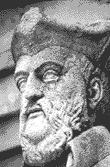
 |
 |
|
|---|---|---|
|
Accueil |
Frontispices |
|
 |

 |
 |
|
|---|---|---|
|
Accueil |
Frontispices |
|
 |
ANALYSE |
25
A rejoinder to Halbronnís review of my book on Nostradamus |
In his review of my recent book on Nostradamus1, Jacques Halbronn assesses supposed conclusions that I did not reach in my work.2 Halbronn makes a crucial mistake in criticising one of my arguments in which I refer to the interpretation of quatrain C 4.44 by Roger Prévost.3 He gives the impression, that I believe that with his interpretation Prévost has presented the proof of the prophetic abilities of Nostradamus. If he would have read and cited me correctly he would have seen, that my conclusion is completely different. All that I say in this respect is, that if the Macé Bonhomme edition was indeed published in 1555 and if Provostís interpretation (in which he related the quatrain to events in the year 1562) would be right, then and only then, he would himself have produced the evidence that Nostradamus has prophetic powers - an evidence that he certainly would not have wanted to generate, as he thinks that the work of Nostradamus is all historical and not prophetic. In my book I have expressed this idea, just as I did now, in the subjunctive mood! My conclusion though is not - as Prévost and Halbronn do - that the Bonhomme 1555 edition must be an antedated publication, but rather that the solution presented for C 4.44 by Prévost is wrong. I therefore go on (p. 128) to present the explanation given by BrindíAmour, who thinks that C 4.44 contains a reflection of events during the “révolte de la gabelle” in 15484, which seems plausible to me. Hence if the Bonhomme edition was really out by 1555 Nostradamus may still have drawn upon an historical event. All I present in this section is a criticism of scholarly interpretations of the type of Prévost, which can and may as well point in a totally wrong direction. It was certainly not meant as a proof for the precognitive or prophetic powers of Nostradamus.
By making the connection with my previous work in the field of parapsychological research, Halbronn makes it seem, as if I want to save the idea of Nostradamus being a prophet, whose precognitive abilities have been attested. I am surprised that he needs to bring into play such an argumentum ad hominem, without grasping the substance of my line of reasoning, which indeed points to a totally opposing conclusion! It seem obvious to me that Halbronn has only read the parts of the book that deal with the “criticism of the critics”. Otherwise it could not have gone unnoticed that my main argument, covering extensive portions in my text, is the corroboration that not one single quatrain contains irrefutable evidence of prophetic contents (pp. 246 - 291). Furthermore in my detailed analysis of spontaneously expressed prophecies, consultations and interpretations of horoscopes, notably the horoscope cast for prince Rudolph of Habsburg. (pp. 293 - 347).5 I reach the conclusion that again there is no evidence that Nostradamus had precognitive abilities, which can be deducted from his works. The horoscope for Rudolph lent itself especially to this kind of study, as the biography of the later emperor Rudolph II is very well known.
I even include in my book a section on our present knowledge about precognition, relying on the recent developments in psi research (pp. 361 - 370). In it I show the misery of the so called great prophets, who supposedly have foreseen collective events, like tragedies, devastation, wars etc., all of which can be reduced to erroneous interpretations, later amendments, and falsifications. Furthermore from the point of view of parapsychology it would be complete fantasy to conclude, that Nostradamus had such paranormal powers as to predict detailed future events. Laboratory research does not support such a possibility at all.6 Even though the existence of precognitive abilities cannot be denied, as meta-analyses of the studies in precognition have shown beyond any doubt7, precognitive information is usually perceived on a subconscious level and can only be registered by physiological measurements.8 In only very few instances it is accompanied by visions, auditions and other cognitive capacities, but then usually confined to experiences concerning the personal realm.
The nucleus of my argument is, that Nostradamus may have had transpersonal and paranormal experiences (maybe due to a predisposition) and these might have resulted in the personal conviction of being able to foresee future events. But undeniably there is no evidence that he had predicted any future occurrence, as I make very clear in my book. Not without reason I have therefore entitled the epilogue to my book “Farewell to the prophet“.9
I have drawn the attention to the question of precognitive / prophetic abilities from the viewpoint of serious research, because this aspect is usually not discussed at all by critical scholars studying the work of Nostradamus. The problem in this respect is, that critical scholars who depart from the conviction that no prophetic (precognitive) abilities exist in the first place, are contradicting the very basis of critical research. By definition it should always proceed from empirical evidence and not from any preconceived ideas. The conclusions I reach in my book show, that taking account of the question of critical examination of precognitive abilities does not necessarily lead to the result of accepting Nostradamus as a man with outstanding paranormal abilities - on the contrary !
Elmar R. Gruber
Notes
1 Cf. Elmar R. Gruber, Nostradamus. sein Leben, sein Werk und die wahre Bedeutung seiner Prophezeiungen, Berne, Scherz, 2003. Retour
2 Cf. La célébration du cinquième centenaire de la naissance de Michel de Nostredame (Nostredame.chez.tiscali.fr., Analyse 19). Retour
3 Cf. Le mythe et la réalité, Paris, Laffont, 1999, p. 64. Retour
4 Cf. Pierre BrindíAmour, Nostradamus. Les premières Centuries ou Propheties (Edition Macé Bonhomme de 1555), Genève, Droz, 1996, p. 527. Retour
5 Cf. my article on Nostredame.chez.tiscali.fr, Analyse 23. Retour
6 Cf. Elmar R. Gruber, Psychic Wars, Blandford, London, 1999. Dean I. Radin, The Conscious Universe: The Scientific Truth of Psychic Phenomena, San Francisco, Harper Edge, 1997. Retour
7 Cf. les Honorton und Diane C. Ferrari, “Future Telling : A Meta-Analysis of Forced-Choice Precognition Experiments”, 1935 - 1987, Journal of Parapsychology, 35, 1989, 281 - 308. Retour
8 Dean I. Radin, “Unconscious Perception of Future Emotions. An Experiment in Presentiment”. Proceedings of the 39th Parapsychological Association Convention, San Diego, 1996, 171 - 185 ; Dick J. Bierman und Dean I. Radin, “Anomalous Anticipatory Response on Randomized Future Conditions“. Perceptual & Motor Skills, 84, 1997, 689 - 690. Retour
9 Cf. “Abschied vom Propheten”, p. 419. Retour
Retour Analyse
Tous droits réservés © 2003 Elmar R. Gruber